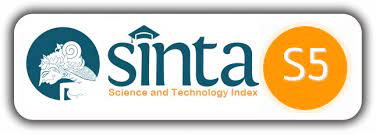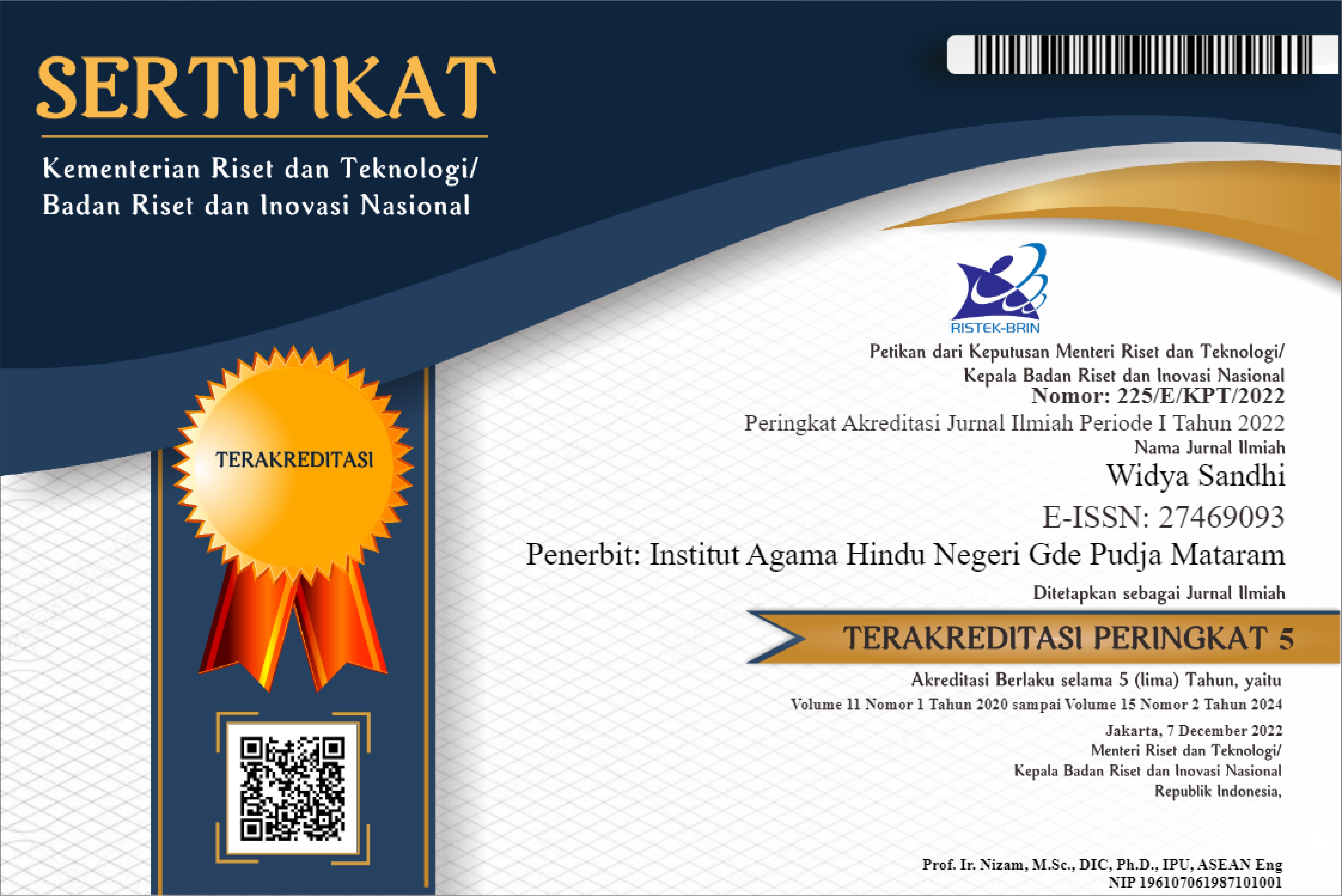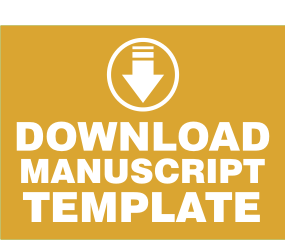PENGHAYATAN TERHADAP KONSEP KETUHANAN PADA MASYARAKAT HINDU DI LOMBOK
Abstract
This paper is the result of research that aims to study the appreciation of the concept of divinity in Hindu societies in Lombok. This research was designed in a qualitative descriptive study to reveal the dimension of appreciation of the concept of divinity in Hinduism in Lombok. Based on the results of this study it was found that the implementation of religion in the midst of the life of the Hindu community in Lombok has similarities with the implementation of Hindu religion in Bali. The similarity is caused by several factors. First, Hindu societies in Lombok are migrants, most of whom migrated to Lombok after the Karangasem Kingdom arranged for social, cultural and religious life around the 16th century when there was an expansion of power to Lombok. Second, the reference sources used as guidelines for implementing religion by the Balinese in Lombok are almost the same as the reference sources used by their ancestors in Bali. Third, there is a policy from the royal government to implement a system in the form of a pasuara that is related to the implementation of Hinduism in Balinese communities in Lombok. Fourth, other factors that support, especially those related to the cultural adaptation of Balinese people with their new settlements in Lombok.
The implementation of Hinduism in Lombok which uses the identity of the mention of the divine aspect with local dimensions is not released by the existence of divine concepts in the belief system of the Hindu community in Bali. With regard to that the existence of a divine identity that is not found in reference to the Vedic scriptures is a local wisdom that is used to appreciate the aspect of divinity so that the relationship between local Hindus and supernatural powers is closer. This is also based on the teachings conveyed by the Siwatattwa teaching that teach the dimension of divinity by giving a term that is very familiar with the life of the people of the archipelago. There is no belief in the aspect of divinity called local identity in relation to this matter in the scriptures. Vedas are not a mistake, but a truth that grows within Hindus on the basis of their respective beliefs. In line with that, it should not be a matter of difference in the mention of the name of God because of the nature of God that the versatile Brahman has many names according to the way Hindus live it. The most important thing in this context is that the implementation of Hinduism as implemented by the Balinese people in Lombok has essentially carried out the teachings of the Vedic scriptures that have been internally integrated with local culture.
References
Arthur A. Valons, 1991, Mahanirwana tantra, Terjemahan Nila.K., Denpasar : Upada Sastra.
Abinash Candra Bosh, 1990, Panggilan Weda, terjemahan I Wayan Sadia, Jakarta : dharma Sarati
Cudamani, 1998, Bagaimana Umat Hindu Menghayati Ida sang Hyang Widhi, Surabaya : Paramita.
Griffith Ralph T.H., 1986, The Hymns Of The Rg. Veda, Delhi : Motilal Banarsidass
Goundriaan T. and Hooykaas C, 1971, Stuti and Stava, Amsterdam-London : North-Holland Publishing Company.
Hamidi,2004, Metode Penelitian Kualitatif, Malang:Univ.Muhammadiyah
Koentjaraningrat, 1992, Beberapa Pokok Antropologi Sosial, Jakarta: Dian Rakyat
Dhavamony, Maria Sussai. 1995, Phenomenologi Agama, Yogyakarta: Kanisius
Nazir Mohamad, 1999, Metode Penelitian, Jakarta: Ghalia Indonesia
Ngurah I Gusti Made, 1999, Buku Pendidikan Agama Hindu Untuk Perguruan Tinggi, Surabaya: Paramita
Pudja, G, 1977, Theologi Hindu, Jakarta, Mayasari.
________, 1985, Suatu Pengantar dalam Ilmu Veda, Jakarta: Dharma Sarati
------------, 1990, Wedaparikrama, Jakarta : Dharma Sarati
________, 1995, Sama Weda, Jakarta : Hanuman Sakti.
Pudja dan Sudharta, Tjok, Rai, 1973, Manawa Dharmasastra, Jakarta, Lembaga Penerjemah Kitab Suci.
Pritchard E.E. Eva, 1984, Agama-Agama Primitif, Yogyakarta.
Rai Mirsa I G. N., Sura,.I G.,Dunia I W.Sindhu I.B.,Dalem I.G.K.,Sukayasa I.W. 1994, Wrhaspati Tattwa, Denpasar: UPD. Kadokbud Bali
-------------------, 1994, Ganapati Tattwa, Denpasar : UPD. Kadokbud Bali
-------------------, 1994, Tatwa Jnana, Denpasar : UPD. Kadokbud Bali
--------------------,1994, Buana Kosa, Denpasar :Upada sastra
Rai Arnita I.G.A., Sura I G., Dunia I W., Sindhu I.B., Dalem I G.K. Sukayasa I W., 1995, Bhuana Sangksepa, Denpasar : Kadokbud Bali
----------------------, 1995, Sang Hyang Mahajnana, Denpasar : Kadokbud Bali
----------------------, 1995, Siwa tattwa Purana, Denpasar : Kadokbud Bali
Santri, Raka, 2000, Tuhan Dan Berhala, Denpasar, Yayasan Dharma Naradha.
Soejono, 1999, Metode penelitian Suatu Pemikiran Dan Penerapan, Jakarta: Rineka Cipta
Sudarto, 1997, Metodologi Penelitian Filsafat, Jakarta: Raja Grafindo Persada
Sura I Gede, 1994, Agama Hindu, Sebuah pengantar, Denpasar: Kayumas Agung
-------------,1991, Pengantar Veda Dan Upanisad, Denpasar, Sari Sri Sedana
-------------, 2001, “Ajaran Ketuhanan Dalam Agama Hindu Di Bali”, Denpasar: Makalah yang tidak dipublikasikan
Suryabrata, Sumadi,200, Metodologi Penelitian, Jakarta : Raja Grafindo persada
Sastra, Gede Sara, 1994, Konsepsi Monotheisme Dalam Agama Hindu, Denpasar : Upada Sastra
Sivananda, Sri Svami, 1993, Intisari Ajaran Hindu, Surabaya, Paramita
Tim Penyusun Buku-Buku Agama Hindu, 2000, Panca Yadnya,Denpasar: Pemprop Bali
--------------------------,2000, Siwatattwa, Denpasar Pemprop Bali
Titib I Made, 1995, Ketuhanan Dalam Weda, Denpasar: Pustaka Manikgeni
---------------------------, 1998, Veda, Sabda Suci, Pedoman Praktis Kehidupan, Surabaya: Paramita
Wirawan, I W.A. 1999. “Studi Komparatif Kerangka Konsep Ketuhanan dalam Kitab Suci Veda dan Kitab Siwatattwa sebagai Sumber Pedoman Beragama Hindu di Bali”. Denpasar: Skripsi STAHN

This work is licensed under a Creative Commons Attribution-NonCommercial-ShareAlike 4.0 International License.
Authors who publish with this journal agree to the following terms:
- Authors retain copyright and grant the journal right of first publication with the work simultaneously licensed under a Creative Commons Attribution-ShareAlike 4.0 International License. that allows others to share the work with an acknowledgment of the work's authorship and initial publication in this journal.
- Authors are able to enter into separate, additional contractual arrangements for the non-exclusive distribution of the journal's published version of the work (e.g., post it to an institutional repository or publish it in a book), with an acknowledgment of its initial publication in this journal.
- Authors are permitted and encouraged to post their work online (e.g., in institutional repositories or on their website) prior to and during the submission process, as it can lead to productive exchanges, as well as earlier and greater citation of published work (See The Effect of Open Access).






.jpg)




